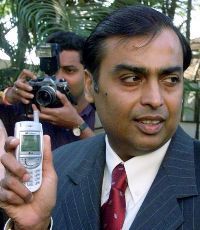 | « Back to article | Print this article |
 The department of telecommunications has repeated the government has not done anything wrong in allowing Mukesh Ambani-owned Reliance Jio Infocomm to transfer its internet service provider licence to a unified licence, or in the auction of the broadband wireless access spectrum in 2010, as alleged in a draft report of the Comptroller & Auditor General.
The department of telecommunications has repeated the government has not done anything wrong in allowing Mukesh Ambani-owned Reliance Jio Infocomm to transfer its internet service provider licence to a unified licence, or in the auction of the broadband wireless access spectrum in 2010, as alleged in a draft report of the Comptroller & Auditor General.
DoT and the company have not done anything that breached the guidelines mentioned in the notice inviting applications for the auction of the BWA spectrum in 2010, it stated in a reply to CAG’s draft audit report.
CAG has said DoT had failed to recognise 'telltale signs of rigging' in the 2010 auctions and had enabled an unknown company, Infotel Broadband Services Pvt Ltd, to acquire pan-India broadband spectrum by paying 5,000 times its net worth of Rs 2.5 crore (Rs 25 million).
According to the report, IBSPL had made an earnest money deposit of Rs 252.5 crore (Rs 2.52 billion) and won 20 Mhz of pan-India BWA spectrum.
It had through the 'covert and overt assistance of third party or private bank' bid for Rs 12,847.77 crore (Rs 128.47 billion) and sold the company to a Reliance Industries Limited entity on the day of completion of the auction.
CAG accused IBSPL and RIL, the parent of Jio, of conspiracy, and has asked for a probe into the whole matter.
It has asked DoT to cancel the broadband spectrum the company was allotted after the 2010 auctions, and to give 'exemplary punishment' on the colluding firms.
According to the report, DoT had favoured Jio by allowing it to convert its ISP permit, which would enable the firm to offer voice services, for Rs 1,658 crore (Rs 16.58 billion), a price telcos paid in 2001 when the sector was in its infancy and a price struck down by the Supreme Court in 2012.
“Hence, Reliance Jio Infocomm appeared to have been accorded an undue advantage of Rs 22,848 crore,” (Rs 228.48 billion) the draft report noted.
DoT, in its reply to CAG, has said the government has not only the sovereign right to take policy decision but is also duty-bound to take necessary steps to achieve policy objectives.
The decisions were of similar policy nature to fulfil the larger policy objectives in the interest of the economy, it added.
DoT said the policy decisions were timely and in fulfilment of mandate given by the Cabinet and taken with the approval of the then telecom minister.
The observations of the audit, in effect, challenge the decision-making powers of various organs of the government and the authority vested under the rules of business with the telecom minister, added DoT.
It also seeks to substitute the wisdom and the decisions of the decision-making authorities of relevant time with that of another alternative approach suggested in the report which need not have been the best approach, DoT noted, asking CAG to delete the paras in the draft report.
DoT, in its reply, has explained that the rules for 3G and BWA spectrum before a 2010 auction did not restrict BWA winners from providing voice telephony.
“IBSPL complied with all the required documents and the spectrum was being sold through a competitive bidding, so there were no restrictions on sale of equity,” said a DoT official seeking anonymity.
Image: Mukesh Ambani